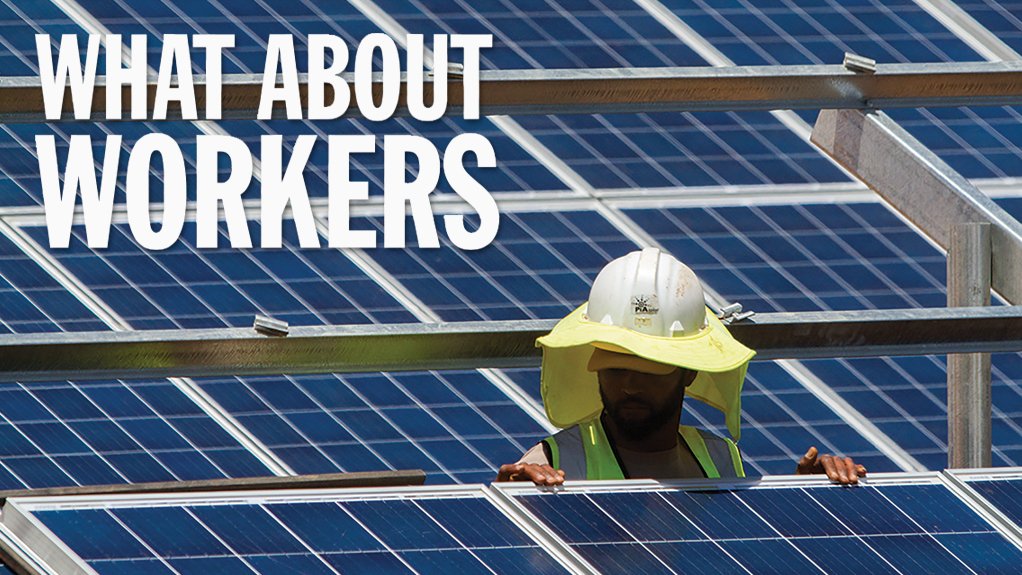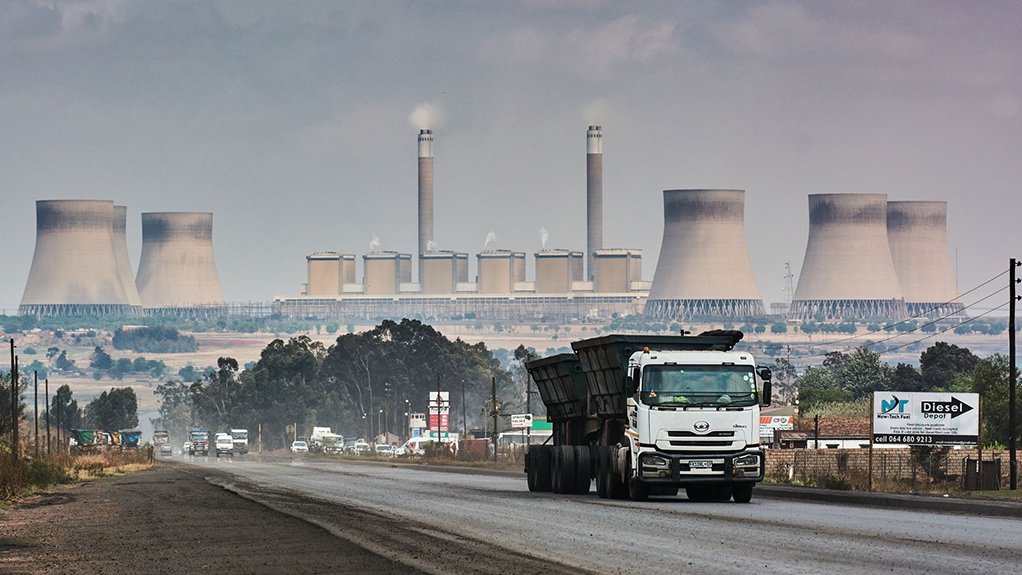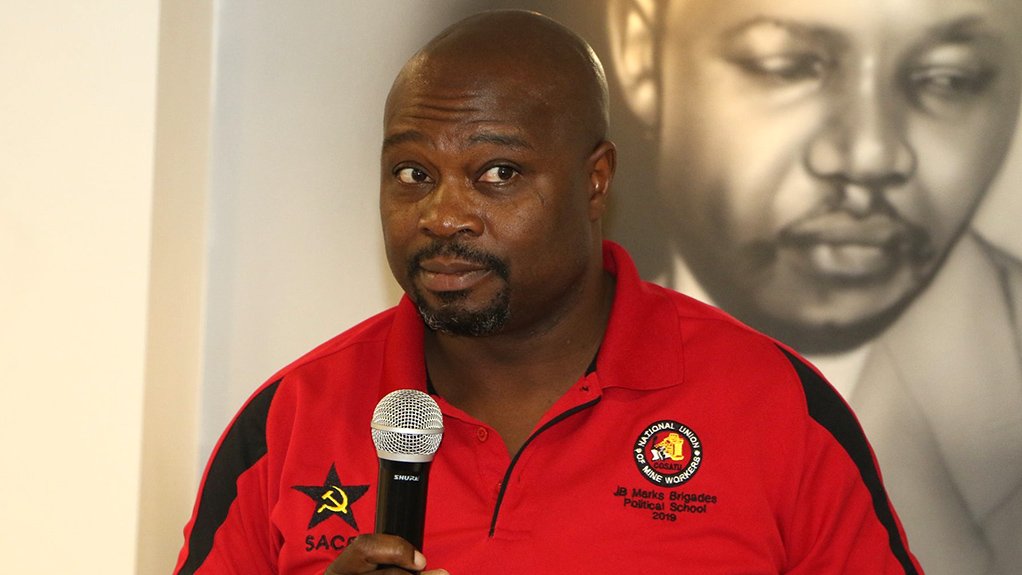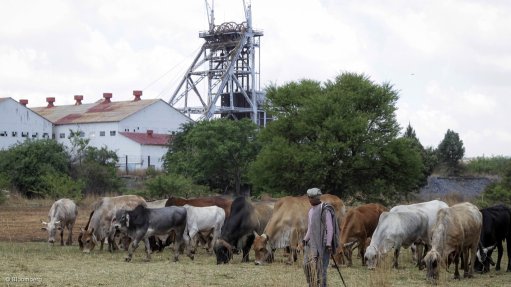Workers must play central role in shaping just energy transition, unions insist






NECESSARY INDUSTRY There are still unresolved questions around the just energy transition, such as the future of coal
Photo by Bloomberg
AMCU organisational development head Krister Janse van Rensburg
AMCU organisational development head Krister Janse van Rensburg
NUM energy sector coordinator Khangela Baloyi
As South Africa continues on its journey towards realising a just energy transition (JET), workers and unions have expressed their support for the move and for alternative sources of energy to be part of the energy mix, provided that labour plays a significant role, that its views are taken on board and that a social-ownership model is pursued.
Associated Mineworkers and Construction Union (AMCU) organisational development head Krister Janse van Rensburg emphasises that a transition to a low-carbon development path is crucial to addressing climate change and resolving “the deep crisis” the South African economy finds itself in.
AMCU’s position on the need for a working-class-led JET was set out five years ago, and the union is resolute that the issue of climate change should be dealt with in the context of South Africa’s reality of extreme inequality, mass unemployment and underdevelopment, he says.
The union embraced the goal of a low- carbon transition as early as 2017 because of the possibility of creating considerable climate jobs by following a public pathway approach to reduce the carbon intensity of the economy.
Janse van Rensburg explains that the union defines a ‘climate job’ as one that helps to reduce greenhouse-gas emissions.
“Decarbonising our energy sector, expanding our public transport in ways that take polluting trucks and cars off the road, retrofitting buildings to enhance energy efficiency and agroecology are all examples of the potential for creating climate jobs,” he notes.
AMCU adopted Resolution 5, which deals with environmental issues, including the issue of a just transition, at its national congress on September 20, 2019.
Janse van Rensburg emphasises that the just transition must be designed in such a way that it ensures that industries remain sustainable and that it stimulates economic growth that will drive social progress.
Before South Africa can embark on any systematic form of transitioning from fossil fuels to renewable-energy sources, it is critical to conduct a series of thorough and proper socioeconomic-impact assessments, he notes.
Areas that are likely to be most affected by the possible closures of fossil-fuel-based energy operations must be prioritised and addressed through meaningful consultation, similar to what transpired around the special economic zones already implemented in South Africa, Janse van Rensburg says.
What is needed is a well-planned energy transition to attain the long-term goal of an economy based on renewable and other forms of low-carbon energy. However, this goal should be achieved using a gradual and phased process, with every phase matched with industrialisation and beneficiation, as well as the upskilling of workers, to ensure that economic development and social progress are furthered, he advocates.
Meanwhile, insight into the National Union of Mineworkers’ (NUM’s) stance on the JET can be gleaned from its ‘Just Transition and the Energy Sector’ report, which the union presented for discussion and adoption during its yearly congress in March.
The NUM indicated during the conference that trade unions were not opposed to the ultimate objective of the country’s transition to a low-carbon, climate-resilient economy, but there were reservations about how the concept was defined and about the proposed path to achieve that objective.
A key concern for both AMCU and the NUM is the anticipated loss of jobs and livelihoods, especially in the energy and mining sectors, resulting in their reluctance to fully embrace the JET.
The reservations stem from, besides others, calls by some just energy proponents for an immediate halt to coal use, as well as little consideration of the opportunity cost and socioeconomic implications of phasing coal out, the NUM noted at its conference.
The union also pointed out that unresolved questions, such as the future of coal and what an appropriate pace of the transition should be, remained.
Concerning the potential pathways that are being considered for a JET, the NUM said that, while renewable-energy sources, especially solar and wind, had been identified as potential key drivers, they posed risks to jobs, owing to the different skills required.
The NUM added that, while nuclear energy was potentially clean and more reliable, consensus on this within the union had not been reached.
Further, while the report acknowledges the negative impact of coal on the environment, it notes that this energy mineral remains a strategic national resource for the country and that, therefore, it cannot simply be discarded.
The report’s proposed resolution for the JET includes its being underpinned by four pillars: social dialogue, social protection, rights at work, as well as employment protection and creation.
Research to inform the process and implementation of the transition must be done to ensure that the transition is just, the report emphasises.
The NUM also indicated that the ultimate goal for the country should be net-zero emissions, rather than zero emissions.
The report further states that the pace and timing of the transition should not be based on environmental concerns only, but must also consider the socioeconomic implications for the country.
Meanwhile, the Congress of South African Trade Unions’ (Cosatu’s) Just Transition Blueprint for Workers 2022: Summary Document, which builds on the union’s Policy Framework on Climate Change adopted in 2011, outlines several demands for the JET.
The top five demands are for a just transition as an employment-creating and sustainable industrial policy, a universal basic income grant, reskilling and upskilling, land distribution and to end austerity for a climate just macroeconomic framework.
The blueprint outlines Cosatu’s vision for the just transition as ‘ecosocialism’, which is structured around meeting human needs so that everyone can live a healthy and productive life.
The key principles of this vision, which will shape recommendations and proposals that workers will fight for, are economic transformation towards democratic ownership, sustainable worker livelihoods and wellbeing, as well as a low-carbon and climate-resilient economy.
The document further states that a JET must address the unemployment and ecological crises, and emphasises that the development of new green industries must not become an excuse for lowering wages and providing fewer social benefits.
Public Led
Speaking on AMCU’s position, Janse van Rensburg points out that there are major technical and spatial challenges in shifting the country’s electricity system to one where variable wind and solar power play an increasingly large role. There are also challenges regarding battery storage, baseload provision and transmission upgrades.
He argues that only a public energy system can address these challenges in ways that are based on a robust assessment of all available options, the likely timeframes and various mechanisms for public financing, while private interests can neither meet the scale of new generation capacity nor the upgrading of the grid to manage variable sources.
Therefore, Eskom remains critical and key to ensuring that the country’s development requirements are met, with the utility needing to be rebuilt and transformed to achieve this.
He adds that unbundling will not solve Eskom’s problems, and emphasises that this is nothing but a pathway to privatisation.
AMCU, he points out, remains convinced that energy provision must remain an essential public service, as it constitutes a basic human right.
“The notion that renewable-energy generation should be left in private hands is completely misplaced, as it will undermine the socioeconomic imperative placed upon government,” he outlines.
Janse van Rensburg avers that there will be no private investment in the power sector without guarantees for independent power producers (IPPs) and assurances for developers in the form of long-term power purchase agreements, which, he says, will lock in private profit at the expense of Eskom and the public.
This, he argues, will ensure that private players profit, while the public sector loses the important role it must play in providing power – be it fossil-based or renewable – to the public.
Instead of IPPs, local communities must be allowed to participate in power generation to meet their own needs and to sell to the grid, with the proceeds used for social upliftment.
All equipment required for renewable energy must be manufactured and maintained locally – ideally in the same rural areas where fossil-fuel-producing industries have been closed – while mines that have been closed must be replaced with light industries and industrial parks, Janse van Rensburg adds.
Echoing some of these sentiments, the NUM report indicates that, while the union supports bold and urgent action to address climate change, it is opposed to a “green structural adjustment” that is led by government and other organisations, such as the International Monetary Fund, and financial institutions.
The report states that, while South Africa can take preliminary steps to advance the transition away from coal, it must first withdraw its proposal to unbundle Eskom, declare a moratorium on the Renewable Energy Independent Power Producer Procurement Programme (REIPPPP), and find ways of building low-carbon generation capacity that is consistent with preserving energy sovereignty and building local supply chains.
The report does not support the privatisation of energy in South Africa, but calls for a public pathway approach to the energy transition, with the cornerstone of this approach being a fully public, national energy utility – a “new Eskom”.
NUM energy sector coordinator Khangela Baloyi, in an opinion piece released in March, highlighted that the majority of REIPPPP projects being owned by foreign companies was an area of concern.
“While, fundamentally, there is no problem with renewables, the problem is the way the renewables are structured in this country in terms of ownership.”
In the piece, he emphasised that, while renewables were an integral part of a balanced energy mix, it was essential that they be socially owned to ensure that the sovereignty of the country was not undermined.
“The energy security of supply is in the centre of the security of our sovereignty. If the supply of energy is controlled by foreign private hands, they can easily sabotage us during [times] of war,” Baloyi posited.
Rallying Workers
Janse van Rensburg says that AMCU will continue to empower its members with knowledge on the JET through workshops and forums where the issues are discussed and deliberated upon to deliver meaningful policy inputs at all levels of engagement.
He indicates that AMCU also relies strongly on other trade unions in South Africa and abroad, and has been participating in the Trade Unions Energy Democracy (TUED) project, based at the City University of New York, in the US.
The TUED plans to create a specific forum for trade unions of the South, where they can share their views and deliver joint inputs to governments and international policymaking bodies.
Meanwhile, Cosatu’s summary document says the union needs to embed the JET into its local campaigning and negotiating on climate change: “We need to urgently educate our members on the shop floor so that they can identify issues for negotiation and items for intervention. We also need to find ways of extending the discussions and mobilisation into communities.”
Article Enquiry
Email Article
Save Article
Feedback
To advertise email advertising@creamermedia.co.za or click here
Press Office
Announcements
What's On
Subscribe to improve your user experience...
Option 1 (equivalent of R125 a month):
Receive a weekly copy of Creamer Media's Engineering News & Mining Weekly magazine
(print copy for those in South Africa and e-magazine for those outside of South Africa)
Receive daily email newsletters
Access to full search results
Access archive of magazine back copies
Access to Projects in Progress
Access to ONE Research Report of your choice in PDF format
Option 2 (equivalent of R375 a month):
All benefits from Option 1
PLUS
Access to Creamer Media's Research Channel Africa for ALL Research Reports, in PDF format, on various industrial and mining sectors
including Electricity; Water; Energy Transition; Hydrogen; Roads, Rail and Ports; Coal; Gold; Platinum; Battery Metals; etc.
Already a subscriber?
Forgotten your password?
Receive weekly copy of Creamer Media's Engineering News & Mining Weekly magazine (print copy for those in South Africa and e-magazine for those outside of South Africa)
➕
Recieve daily email newsletters
➕
Access to full search results
➕
Access archive of magazine back copies
➕
Access to Projects in Progress
➕
Access to ONE Research Report of your choice in PDF format
RESEARCH CHANNEL AFRICA
R4500 (equivalent of R375 a month)
SUBSCRIBEAll benefits from Option 1
➕
Access to Creamer Media's Research Channel Africa for ALL Research Reports on various industrial and mining sectors, in PDF format, including on:
Electricity
➕
Water
➕
Energy Transition
➕
Hydrogen
➕
Roads, Rail and Ports
➕
Coal
➕
Gold
➕
Platinum
➕
Battery Metals
➕
etc.
Receive all benefits from Option 1 or Option 2 delivered to numerous people at your company
➕
Multiple User names and Passwords for simultaneous log-ins
➕
Intranet integration access to all in your organisation























